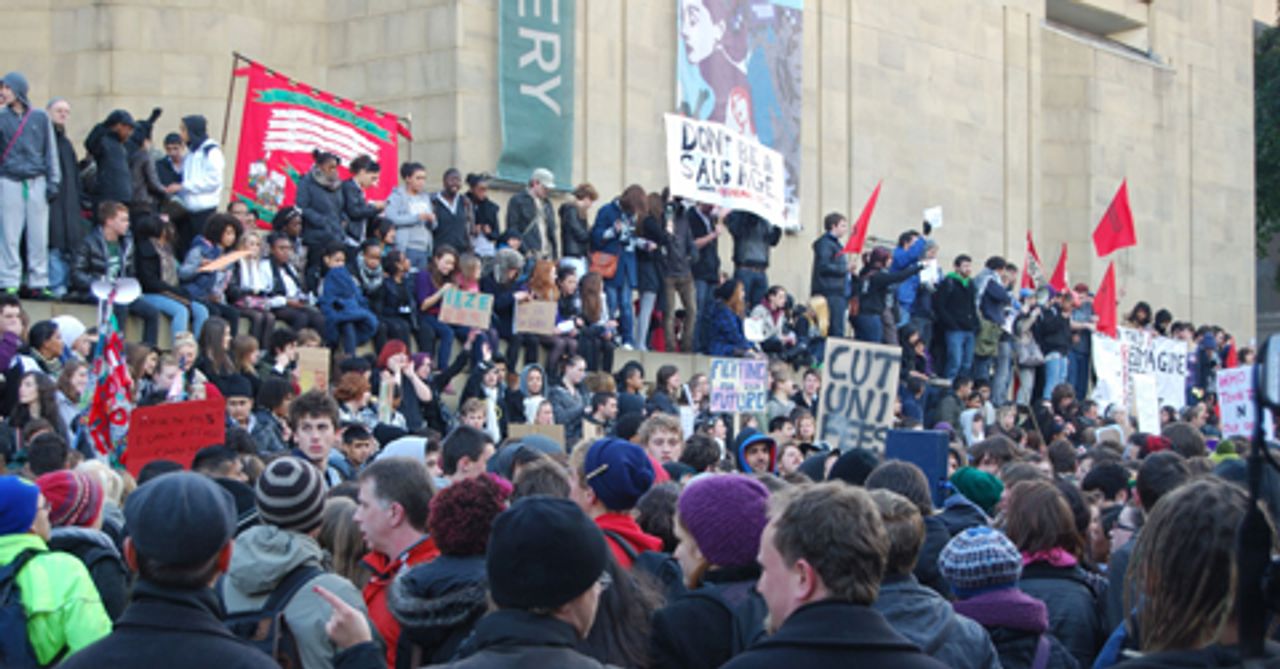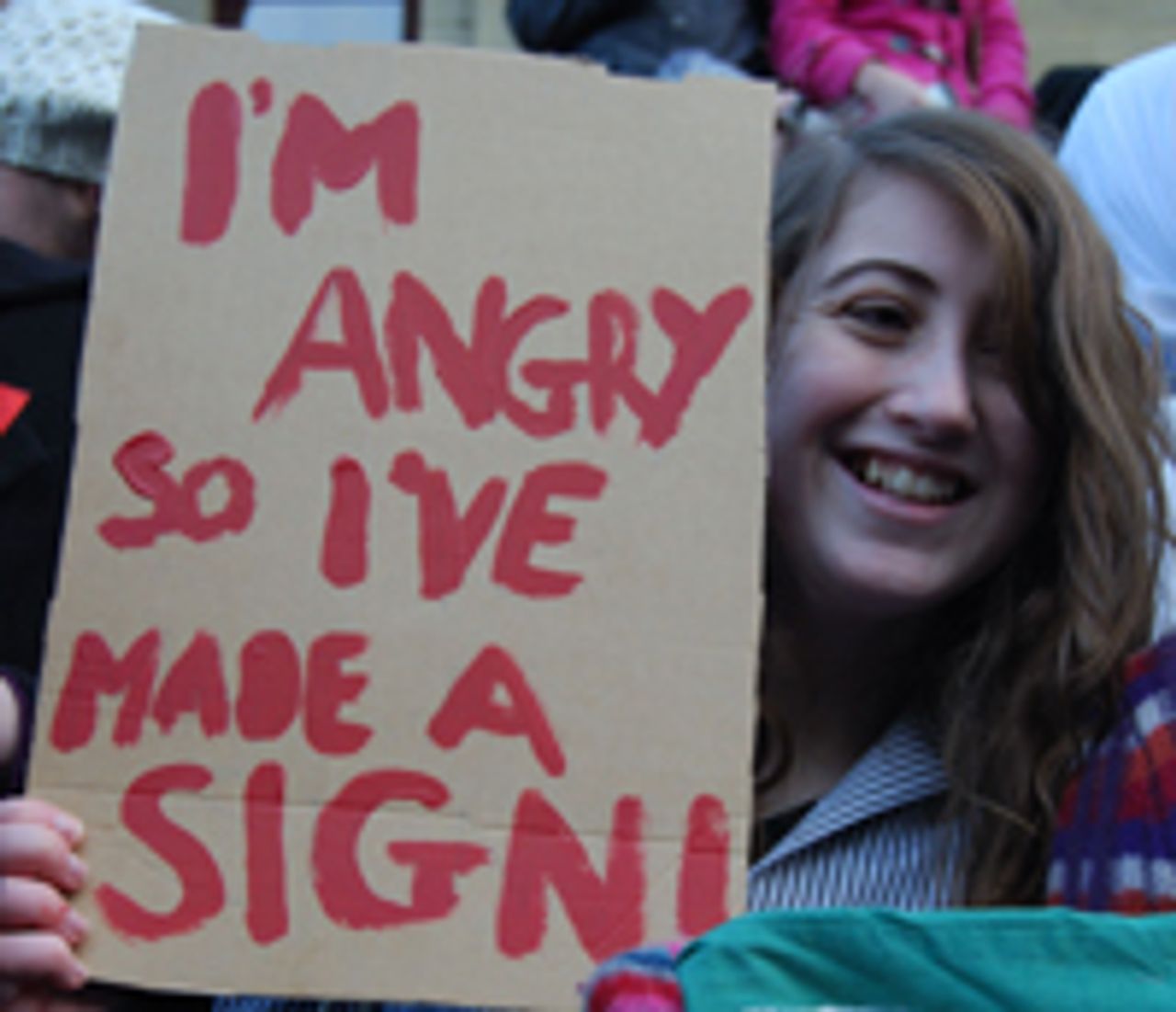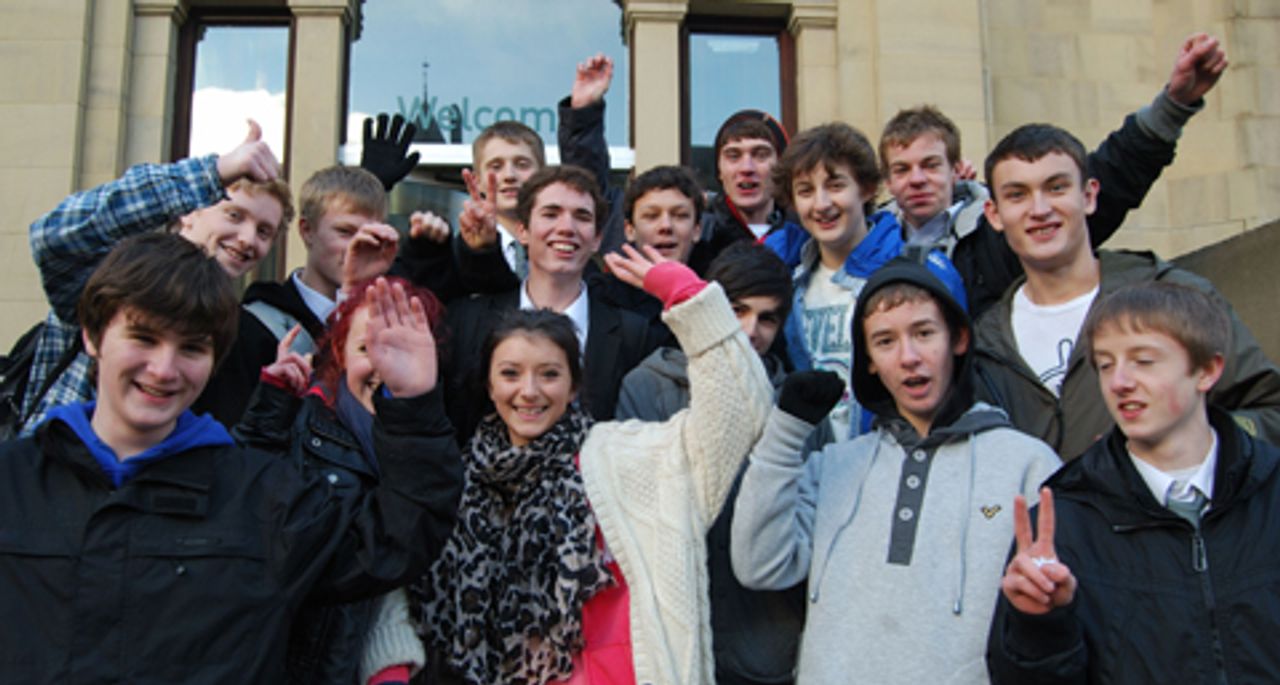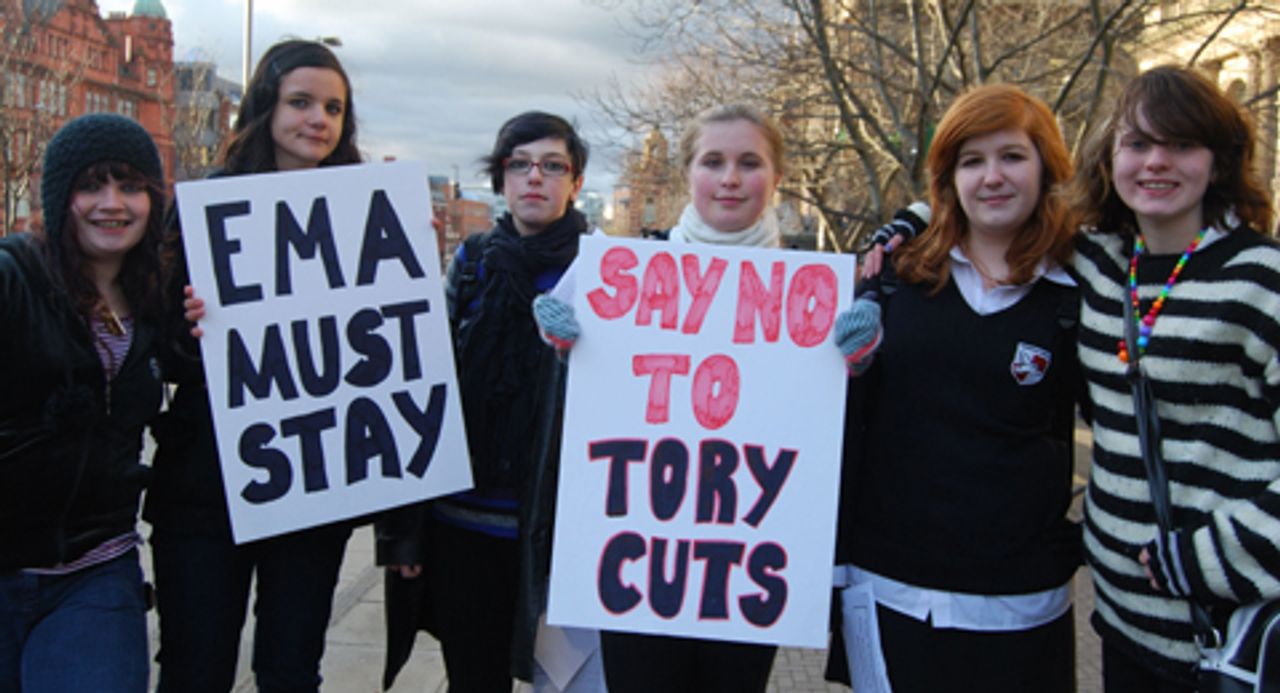A protest of around 10,000 was held in London and marches and demonstrations were held in many other towns and cities including Birmingham, Manchester, Oxford, Cambridge, Leeds, Sheffield, Newcastle, Bournemouth, Glasgow and Cardiff.
Many attending the demonstrations were further education students and sixth-formers between 16 and 18 years old. School pupils, many still in uniform, also walked out of lessons in support of demonstrations in London, Manchester, Sheffield, Winchester, Cambridge and Leeds. Among the issues this age group were protesting are government plans to remove the Education Maintenance Allowance, which provides low-income students with up to £30 a week to help with the costs of staying in full-time education after leaving school at 16.
Wednesday’s protest events were organised largely on an ad hoc basis by local organisations that have sprung up in opposition to the government’s attacks on education. This was evidenced by the proliferation of homemade banners and placards. The protests were a clear manifestation of the indignation felt by young people and students to the National Union of Students, the University and College Union as well as the opposition Labour Party, who had openly sided with the government in condemning student protesters in London two weeks ago and have organised nothing since then.
In London protesters gathered in Trafalgar Square at midday, before setting off for Whitehall, the administrative centre of the British government. The march should have been a fairly straight-forward event that would have passed without incident. However, the police wanted to make an example of protesters against austerity and cuts in line with the state-orchestrated witch-hunt following the protests by university students in London two weeks ago.
To this end, the Metropolitan Police utilised Wednesday’s demo in order to carry out a massive operation against mainly school-aged young people and to make a show of strength. During the last decade the police have dealt with many larger marches and events, particularly those against the wars in Afghanistan and Iraq.
Ahead of the London demonstration, former Met commissioner Brian Paddick said the police would “throw the kitchen sink” at the protest. The Met mobilised 1,500 officers to control the London protest--seven times as many as were present two weeks ago. These included the Territorial Support Group, the Met’s riot police.
Wednesday marked the return to the now notorious strategy of “kettling” that was heavily criticised last year at the anti-G20 demonstrations. Kettling is when police surround and pen in thousands of protesters in small areas for hours on end without access to food, drink or toilet facilities. It amounts to the forced imprisonment of demonstrators without due legal process. As a result of these actions during the G20 protests, Ian Tomlinson, a newspaper vendor making his way home from work, was killed by police brutality.
The demonstration was halted by police on Whitehall, before it was able to reach Parliament Square. The road leading to the headquarters of the Liberal Democrats was also sealed off. Marchers had planned to protest there as Deputy Prime Minister Nick Clegg had promised prior to the general election that the Lib-Dems would vote against any rise in tuition fees. Even before taking office in partnership with the Conservatives, this policy had been abandoned in private--with the Liberals agreeing to support a hike that could see fees triple to £9,000 a year.
Demonstrators attempting to move out of the locked-down areas that had been cordoned off in Whitehall were then attacked with truncheons. After 6pm the police finally allowed about 1,000 demonstrators to leave the kettled area. Further violence then took place, as mounted police charged protesters who had gathered near Trafalgar Square. Some protestors, including schoolchildren were reportedly still being detained under what amounts to street arrest at midnight.
The Met said they made 29 arrests in the capital. The BBC reported that 11 “members of the public” were injured.
The demonstration took place on a day when temperatures plummeted to near freezing. The right-wing Daily Mail reported how, “Some schoolchildren were seen ripping pages from their schoolbooks to burn while others did their homework, complaining that they were cold, tired and hungry.”
The kettling of protesters for hours under these conditions endangered the safety and wellbeing of those involved, a fact the police were well aware of when they commenced the operation on Whitehall. Speaking to Sky News, Graham Wettone, a former Met Police public order intelligence officer, said, “It’s been a successful operation. It’s very warm when you are jumping up and down, but when you are standing still it gets cold very quickly.”
The Met’s Forward Intelligence Teams also took photos of students before and while they had been kettled in Whitehall.
Incidents of police brutality also took place in other cities including Manchester, where a large police presence attacked protesters, including charges by mounted officers. A sit-in on Oxford Road led to protesters being forcibly removed. One student told the Guardian, “Clashes were frequent. I saw several girls have their hair pulled by police, and an ITV journalist was pushed around by police after taking pictures.
“After this, we had a spontaneous march down Oxford Road. The police then blocked off the road near Rusholme, charged the protesters and threatened to arrest anyone who went on the roads.
“A lot of people seemed to be arrested over the course of this evening protest, and traffic on Oxford Road must have been stopped for hours.”
Over the past weeks, the media has largely been in lock-step with the government in condemning the relatively minor instances of vandalism and trespass that occurred in London two weeks ago. This continued unabated throughout the day on Wednesday, with the state broadcaster, the British Broadcasting Corporation, virtually assuming the role of the Ministry for Propaganda. The BBC covered the London protest with a live feed and took every opportunity to praise the police operation and vilify those demonstrating.
During a report given by “Look East’s” Anna Todd, commenting on students jumping over railings in an attempt to join a sit-down protest taking place at the University of Cambridge’s Senate House, she referred to “the rabble” that were involved.
The portrayal of student protesters as violent hooligans and extremists is being routinely employed in order to criminalise any serious manifestation of dissent and opposition to the government’s brutal austerity measures. Even as the protests were taking place Wednesday, education secretary Michael Gove demanded the “full force of the criminal law” be applied against protesters in London.
Gove declared that “It would send completely the wrong message if the government ... if we abandoned that policy because of violence. I respond to arguments, I do not respond to violence.”
He said protesters should be denied the “oxygen of publicity” by the media. This was a phrase used by Conservative prime minister Margaret Thatcher in 1985, referring to the IRA who she denounced as “terrorists and hijackers”.
The protests by students and school pupils are continuing, with at least 10 universities and colleges occupied overnight Wednesday. These include Oxford University’s Bodleian Library, the University of Leeds Student Union, and the Aston Webb building at the University of Birmingham. Royal Holloway, Plymouth, Warwick, London South Bank, UCL, Essex and UWE Bristol, Glasgow, Strathclyde and Dundee Universities. These followed occupations at the School of Oriental and African Studies, Manchester Metropolitan University and University of the West of England that began in the days leading up to Wednesday’s demonstrations. (WSWS)
Home Sri Lanka Think Tank-UK (Main Link)






